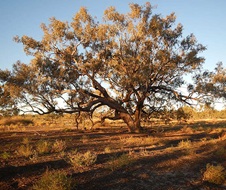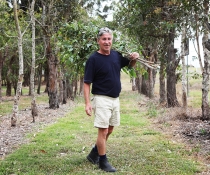Unlawful native vegetation clearing results in enforceable undertaking for landholder
A landholder in the Collarenebri area has entered into an enforceable undertaking with the Department of Climate Change, Energy, the Environment and Water following the unlawful clearing of 534 hectares of native vegetation on their property.

Under the enforceable undertaking, the landholder is required to:
- enter into an in-perpetuity conservation agreement with the NSW Biodiversity Conservation Trust for 654 hectares of land
- commit to restoring the cleared areas of land in the conservation area
- engage an accredited ecologist to monitor the land on an ongoing basis
- pay $300,000 to the department to support actions that help conserve threatened species and communities impacted by the clearing
- pay $50,000 to cover the legal and investigative costs.
The enforceable undertaking will protect endangered Coolibah-Black Box Woodland from clearing on that site in perpetuity.
Landholders are strongly encouraged to contact Local Land Services for advice before they start any land management activities.
Local Land Services is there to help the community understand their land management options and obligations. Local Land Services also supports landholders in managing their land in a productive way while also protecting the natural environment.
Further information can be found on the Local Land Services website.
An enforceable undertaking is a voluntary and binding agreement to deliver tangible benefits for the environment and community.
Enforceable undertakings are one of a number of tools the department can use to achieve environmental compliance and is enforceable by the Land and Environment Court.
Quotes attributed to the department's Biodiversity and Conservation Director North West Sarah Carr
'Native vegetation is vital for the health of our environment. It provides habitat for native animals, protects the quality of soils and water and supports agricultural productivity.
'It's an offence to clear native vegetation on regulated rural land unless landholders have the appropriate approvals under the Local Land Services Act 2013.
'The Local Land Services Act 2013 and the Land Management Code provide landholders with a range of options to lawfully clear their land for the purpose of land management, while also responding to environmental risks.
'Had the landholder sought and been granted these approvals, they could have targeted the clearing to achieve their primary production goals while minimising impacts on native vegetation, and regulatory action could have been avoided.
'We are pleased with the outcome of this regulatory action. The landholder is now aware of the rules around the clearing of native vegetation, and the enforceable undertaking has also enabled the Department of Climate Change, Energy, the Environment and Water to achieve a positive environmental outcome in the area.
'The long-term conservation of this endangered ecological community will deliver a range of benefits to local wildlife, providing habitat, refuge and perching sites, as well as a bountiful source of food for native mammals and birds.'




